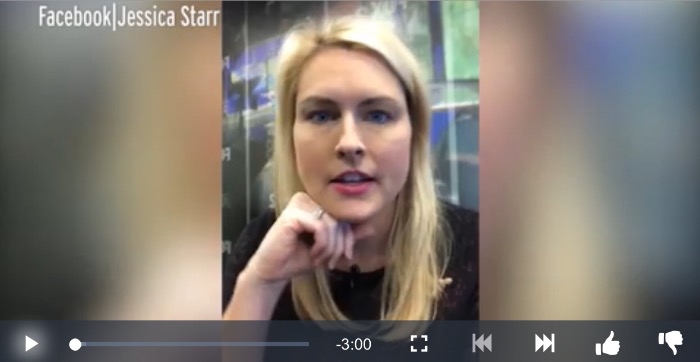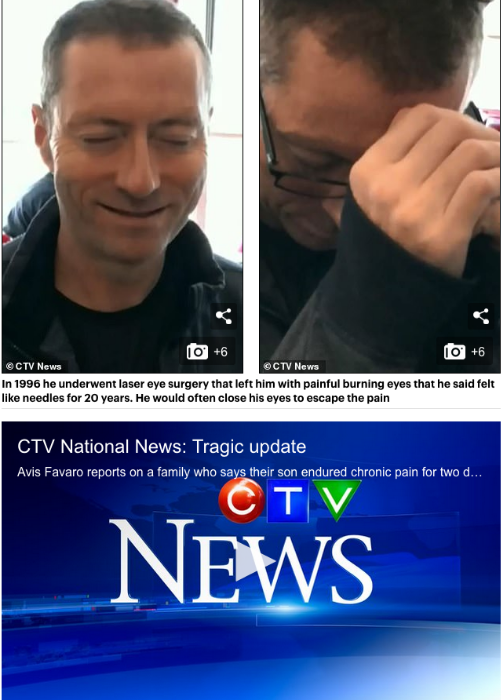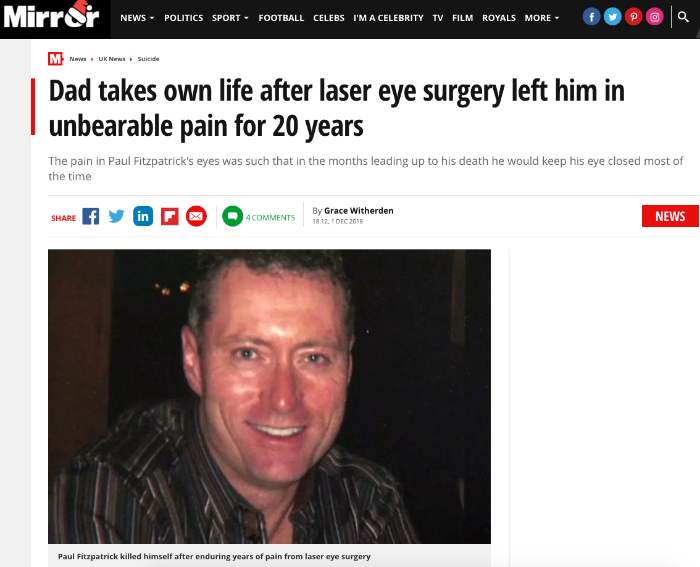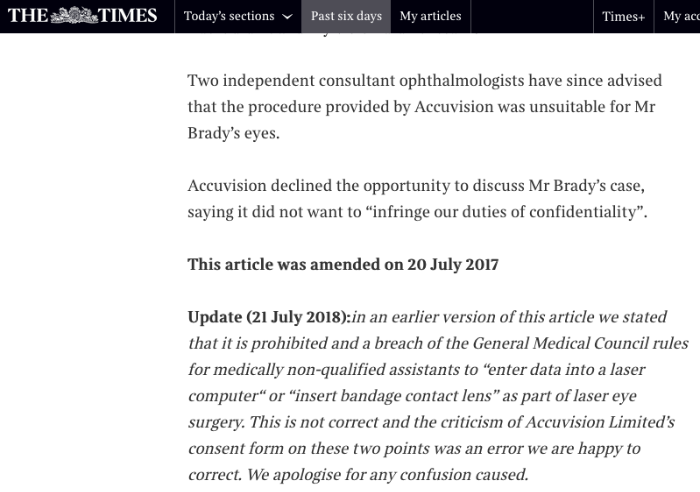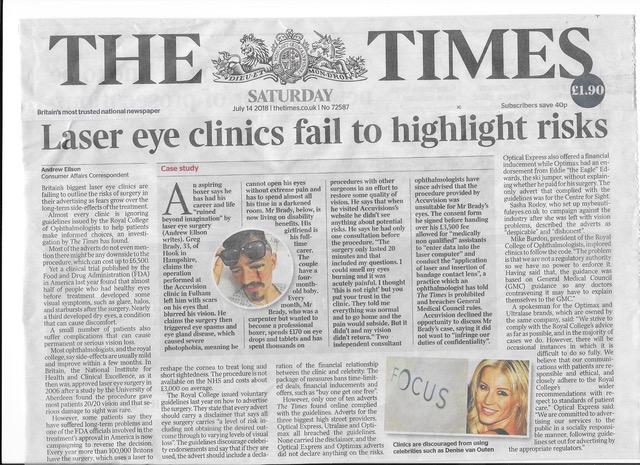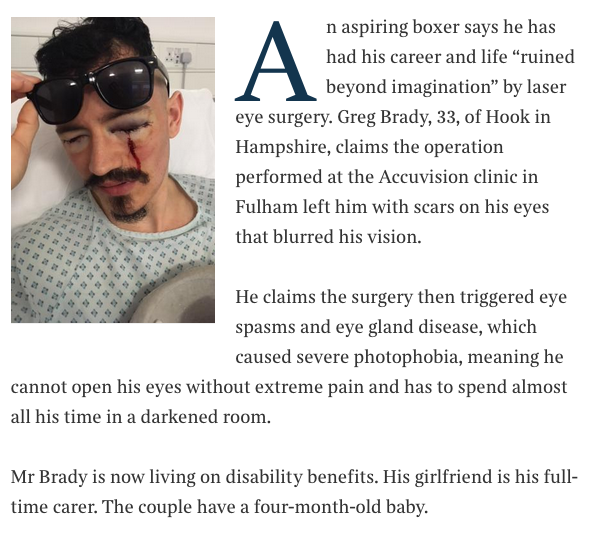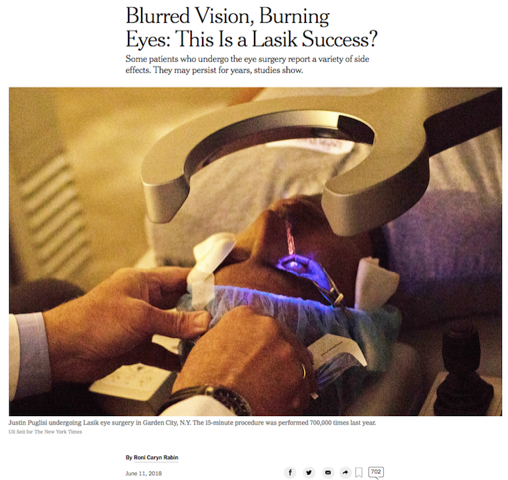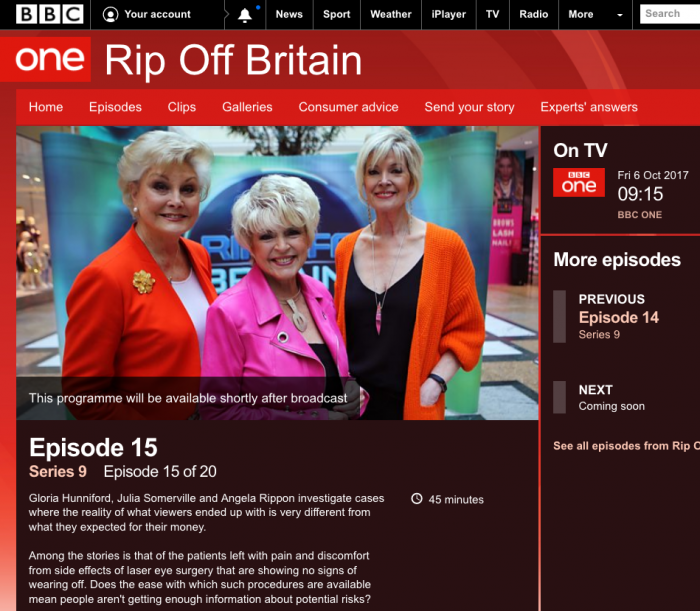PRESS & MEDIA
- admin
-
 Offline
Topic Author
Offline
Topic Author
- Posts: 1163
- Thank you received: 153
No words... only tears for Jessica Starr who committed suicide yesterday, unable to live with the post op problems (including dry eyes) that she suffered as a result of laser eye surgery in October ????
www.facebook.com/100003049068810/posts/1736470039797948/
The truth of the high percentage of people damaged by unregulated refractive surgery already being downplayed by the industry and regurgitated by the press...
‘According to the American Refractive Surgery Council, an organization comprised of industry representatives and medical professionals, more than 19 million LASIK procedures have been performed in the last 20 years, and “the risk of significant, sight-threatening LASIK complications is an extremely low 1 percent.”’
deadline.com/2018/12/detroit-meteorologi...ications-1202519512/
www.facebook.com/100003049068810/posts/1736470039797948/
The truth of the high percentage of people damaged by unregulated refractive surgery already being downplayed by the industry and regurgitated by the press...
‘According to the American Refractive Surgery Council, an organization comprised of industry representatives and medical professionals, more than 19 million LASIK procedures have been performed in the last 20 years, and “the risk of significant, sight-threatening LASIK complications is an extremely low 1 percent.”’
deadline.com/2018/12/detroit-meteorologi...ications-1202519512/
Last Edit:14 Dec 2018 18:02
by admin
Reply to admin
Note: BBcode and smileys are still usable.
- admin
-
 Offline
Topic Author
Offline
Topic Author
- Posts: 1163
- Thank you received: 153
The Mail's account has more detail, but I am sickened to read some of the readers comments below it!
There's a long way to go before people realise that problems like Paul's after refractive surgery are NOT RARE
www.dailymail.co.uk/news/article-6445427...ser-eye-surgery.html
Click on CTV NEWS link to watch video report...
There's a long way to go before people realise that problems like Paul's after refractive surgery are NOT RARE
www.dailymail.co.uk/news/article-6445427...ser-eye-surgery.html
Click on CTV NEWS link to watch video report...
Last Edit:03 Dec 2018 00:20
by admin
Reply to admin
Note: BBcode and smileys are still usable.
- admin
-
 Offline
Topic Author
Offline
Topic Author
- Posts: 1163
- Thank you received: 153
When will the government take us seriously 
www.mirror.co.uk/news/uk-news/dad-takes-...after-laser-13671675
• Journalist Grace Witherden refers to 'PKR' when it is in fact PRK, similar to Lasek.
• Corneal neuralgia is definitely NOT rare after laser eye surgery!
www.mirror.co.uk/news/uk-news/dad-takes-...after-laser-13671675
• Journalist Grace Witherden refers to 'PKR' when it is in fact PRK, similar to Lasek.
• Corneal neuralgia is definitely NOT rare after laser eye surgery!
Last Edit:02 Dec 2018 17:39
by admin
Reply to admin
Note: BBcode and smileys are still usable.
- admin
-
 Offline
Topic Author
Offline
Topic Author
- Posts: 1163
- Thank you received: 153
Although amended, The Times has not corrected or apologised for their statement that it is prohibited, and a breach of the General Medical Council rules, for the 'application of laser' to be performed by medically non-qualified assistants.
To be clear, it is irrefutably illegal for anyone who is not a GMC registered doctor to perform surgical operations!
Page 3, para 8, from the Accuvision consent form signed by Geg Brady...
And whilst I doubt that anyone in their right mind would wittingly allow a medically non-qualified person to operate on them, such a person would have no indemnity policy should anything go wrong, as it so spectacularly and tragically did for Greg Brady!
And I’m guessing that a conviction for a person fraudulently passing themselves off as a surgeon and illegally operating on humans would carry an even lengthier prison sentence than the 3 years Patrick Keniry received for passing himself off as a veterinary surgeon and operating on animals.
www.bbc.co.uk/news/uk-england-somerset-41649840
www.dailymail.co.uk/news/article-4989164...ersonating-vets.html
And any surgeon insane and/or greedy enough to risk destroying his career by colluding with such a fantasist - allowing themselves to be named as the operating surgeon on medical records for instance - would not only be erased from the GMC register so no longer able to practice in the UK, but would also face criminal charges of conspiracy.
Andrew Ellson’s article states that, 'Accuvision declined the opportunity to discuss Mr Brady’s case, saying it did not want to “infringe our duties of confidentiality”.’
I can assure you that Greg Brady provided Accuvision owner Daryus Panthakey with full authority to discuss his case with The Times, emailed and texted from his own accounts in response to a text message from Daryus on 11 July asking for his permission to do so.
Yet even so, Daryus saw fit to instruct TWO different legal firms, over two days, to argue that Greg’s consent was inadequate!
The first solicitor even asked journalist Andrew Ellson for verification of his identity, claiming that his Times email address appeared ‘unusual’!
A lot of time and money spent on delaying tactics that happily didn't succeed in stopping this article going to press.
And I can assure you that this is far from the end of Greg's story
To be clear, it is irrefutably illegal for anyone who is not a GMC registered doctor to perform surgical operations!
Page 3, para 8, from the Accuvision consent form signed by Geg Brady...
And whilst I doubt that anyone in their right mind would wittingly allow a medically non-qualified person to operate on them, such a person would have no indemnity policy should anything go wrong, as it so spectacularly and tragically did for Greg Brady!
And I’m guessing that a conviction for a person fraudulently passing themselves off as a surgeon and illegally operating on humans would carry an even lengthier prison sentence than the 3 years Patrick Keniry received for passing himself off as a veterinary surgeon and operating on animals.
www.bbc.co.uk/news/uk-england-somerset-41649840
www.dailymail.co.uk/news/article-4989164...ersonating-vets.html
And any surgeon insane and/or greedy enough to risk destroying his career by colluding with such a fantasist - allowing themselves to be named as the operating surgeon on medical records for instance - would not only be erased from the GMC register so no longer able to practice in the UK, but would also face criminal charges of conspiracy.
Andrew Ellson’s article states that, 'Accuvision declined the opportunity to discuss Mr Brady’s case, saying it did not want to “infringe our duties of confidentiality”.’
I can assure you that Greg Brady provided Accuvision owner Daryus Panthakey with full authority to discuss his case with The Times, emailed and texted from his own accounts in response to a text message from Daryus on 11 July asking for his permission to do so.
Yet even so, Daryus saw fit to instruct TWO different legal firms, over two days, to argue that Greg’s consent was inadequate!
The first solicitor even asked journalist Andrew Ellson for verification of his identity, claiming that his Times email address appeared ‘unusual’!
A lot of time and money spent on delaying tactics that happily didn't succeed in stopping this article going to press.
And I can assure you that this is far from the end of Greg's story
Last Edit:23 Jul 2018 17:50
by admin
Reply to admin
Note: BBcode and smileys are still usable.
- admin
-
 Offline
Topic Author
Offline
Topic Author
- Posts: 1163
- Thank you received: 153
The Times article looks far more impressive in hard copy than online 
And of course it’s impossible to edit an article already published in a newspaper!
‘This article is the subject of a complaint from Accuvision Limited'
www.thetimes.co.uk/edition/news/i-could-...ly-painful-g057xcq28
While his solicitor is battling with The Times, perhaps Daryus Panthakey - the medically unqualified businessman owner of Accuvision - should keep in mind what it cost Optical Express after they issued their claim against the Daily Mail for alleged libel and malicious falsehood in 2015.
Of course Accuvision wasn't the only laser eye surgery provider mentioned in the article!
'A spokesman for the Optimax and Ultralase brands, which are owned by the same company, said: “We strive to comply with the Royal College’s advice as far as possible, and in the majority of cases we do. However, there will be occasional instances in which it is difficult to do so fully.”'
Difficult why? The Boy Scouts have more stringent guidelines than do the Royal College of Ophthalmologists, whose standards were written by, and for the benefit of, purveyors of refractive eye surgery.
Damaged patients are an inconvenience the College doesn't trouble itself with.
Because it happens so frequently, and Russell Ambrose almost always settles, I forgot to mention that I’m on my THIRTEENTH legal claim v Optimax for breach of agreement.
But it seems Russell wants to go to court with this one. Not personally of course, he simply pays his expensive legal team to fight me.
This time however I’m not representing myself, as I generally (and successfully) do, I'm instructing a barrister, because I have far more important issues to deal with than waste time playing games with a bored rich psychopath, and it has to stop!
NB: Andrew Ellson's article was on page 19 in hard copy, but I have no doubt that this story will be front page news in the not too distant future.
And of course it’s impossible to edit an article already published in a newspaper!
‘This article is the subject of a complaint from Accuvision Limited'
www.thetimes.co.uk/edition/news/i-could-...ly-painful-g057xcq28
While his solicitor is battling with The Times, perhaps Daryus Panthakey - the medically unqualified businessman owner of Accuvision - should keep in mind what it cost Optical Express after they issued their claim against the Daily Mail for alleged libel and malicious falsehood in 2015.
Of course Accuvision wasn't the only laser eye surgery provider mentioned in the article!
'A spokesman for the Optimax and Ultralase brands, which are owned by the same company, said: “We strive to comply with the Royal College’s advice as far as possible, and in the majority of cases we do. However, there will be occasional instances in which it is difficult to do so fully.”'
Difficult why? The Boy Scouts have more stringent guidelines than do the Royal College of Ophthalmologists, whose standards were written by, and for the benefit of, purveyors of refractive eye surgery.
Damaged patients are an inconvenience the College doesn't trouble itself with.
Because it happens so frequently, and Russell Ambrose almost always settles, I forgot to mention that I’m on my THIRTEENTH legal claim v Optimax for breach of agreement.
But it seems Russell wants to go to court with this one. Not personally of course, he simply pays his expensive legal team to fight me.
This time however I’m not representing myself, as I generally (and successfully) do, I'm instructing a barrister, because I have far more important issues to deal with than waste time playing games with a bored rich psychopath, and it has to stop!
NB: Andrew Ellson's article was on page 19 in hard copy, but I have no doubt that this story will be front page news in the not too distant future.
Last Edit:21 Jul 2018 08:54
by admin
Reply to admin
Note: BBcode and smileys are still usable.
- admin
-
 Offline
Topic Author
Offline
Topic Author
- Posts: 1163
- Thank you received: 153
The Times - just published 
www.thetimes.co.uk/edition/news/i-could-...ly-painful-g057xcq28
'Every month, Mr Brady, who was a carpenter but wanted to become a professional boxer, spends £170 on eye drops and tablets and has spent thousands on procedures with other surgeons in an effort to restore some quality of vision.
He says that when he visited Accuvision’s website he didn’t see anything about potential risks. He says he had only one consultation before the procedure.
“The surgery only lasted 20 minutes and that included my questions. I could smell my eyes burning and it was acutely painful. I thought ‘this is not right’ but you put your trust in the clinic. They told me everything was normal and to go home and the pain would subside. But it didn’t and my vision didn’t return.”
Two independent consultant ophthalmologists have since advised that the procedure provided by Accuvision was unsuitable for Mr Brady’s eyes. The consent form he signed before handing over his £3,500 fee allowed for “medically non qualified” assistants to “enter data into the laser computer” and conduct the “application of laser and insertion of bandage contact lens”, a practice which an ophthalmologist has told The Times is prohibited and breaches General Medical Council rules.
Accuvision declined the opportunity to discuss Mr Brady’s case, saying it did not want to “infringe our duties of confidentiality”.
Britain’s biggest laser eye clinics are failing to outline the risks of surgery in their advertising as fears grow over the long-term side-effects of the treatment.
Almost every clinic is ignoring guidelines issued by the Royal College of Ophthalmologists to help patients make informed choices, an investigation by The Times has found.
Most of the adverts do not even mention there might be any downside to the procedure, which can cost up to £6,500.
Yet a clinical trial published by the Food and Drug Administration (FDA) in America last year found that almost half of people who had healthy eyes before treatment developed some visual symptoms, such as glare, halos, and starbursts after the surgery. Nearly a third developed dry eyes, a condition that can cause discomfort.
A small number of patients also suffer complications that can cause permanent or serious vision loss.
Most ophthalmologists, and the royal college, say side-effects are usually mild and improve within a few months. In Britain, the National Institute for Health and Clinical Excellence, as it then was, approved laser eye surgery in 2006 after a study by the University of Aberdeen found the procedure gave most patients 20/20 vision and that serious damage to sight was rare.
However, some patients say they have suffered long-term problems and one of the FDA officials involved in the treatment’s approval in America is now campaigning to reverse the decision. Every year more than 100,000 Britons have the surgery, which uses a laser to reshape the cornea to treat long and short sightedness. The procedure is not available on the NHS and costs about £3,000 on average.
The Royal College issued voluntary guidelines last year on how to advertise the surgery. They state that every advert should carry a disclaimer that says all eye surgery carries “a level of risk including not obtaining the desired outcome through to varying levels of visual loss”. The guidelines discourage celebrity endorsements and say that if they are used, the advert should include a declaration of the financial relationship between the clinic and celebrity. The package of measures bans time-limited deals, financial inducements and offers, such as “buy one get one free”.
However, only one of ten adverts The Times found online complied with the guidelines. Adverts for the three biggest high street providers, Optical Express, Utralase and Optimax all breached the guidelines. None carried the disclaimer, and the Optical Express and Optimax adverts did not declare anything on the risks. Optical Express also offered a financial inducement while Optimax had an endorsement from Eddie “the Eagle” Edwards, the ski jumper, without explaining whether he paid for his surgery. The only advert that complied with the guidelines was for the Centre for Sight.
Sasha Rodoy, who set up mybeautifuleyes.co.uk to campaign against the industry after she was left with vision problems, described the adverts as “despicable” and “dishonest”.
Mike Burdon, president of the Royal College of Ophthalmologists, implored clinics to follow the code. “The problem is that we are not a regulatory authority so we have no power to enforce it. Having said that, the guidance was based on General Medical Council (GMC) guidance so any doctors contravening it may have to explain themselves to the GMC.”
A spokesman for the Optimax and Ultralase brands, which are owned by the same company, said: “We strive to comply with the Royal College’s advice as far as possible, and in the majority of cases we do. However, there will be occasional instances in which it is difficult to do so fully. We believe that our communications with patients are responsible and ethical, and closely adhere to the Royal College’s wider recommendations with respect to standards of patient care.” Optical Express said: “We are committed to advertising our services to the public in a socially responsible manner, following guidelines set out for advertising by the appropriate regulators.”'
Four dry years without press, thanks to Luther Pendragon and Optical Express, but the gloves are off now boys!
www.thetimes.co.uk/edition/news/i-could-...ly-painful-g057xcq28
'Every month, Mr Brady, who was a carpenter but wanted to become a professional boxer, spends £170 on eye drops and tablets and has spent thousands on procedures with other surgeons in an effort to restore some quality of vision.
He says that when he visited Accuvision’s website he didn’t see anything about potential risks. He says he had only one consultation before the procedure.
“The surgery only lasted 20 minutes and that included my questions. I could smell my eyes burning and it was acutely painful. I thought ‘this is not right’ but you put your trust in the clinic. They told me everything was normal and to go home and the pain would subside. But it didn’t and my vision didn’t return.”
Two independent consultant ophthalmologists have since advised that the procedure provided by Accuvision was unsuitable for Mr Brady’s eyes. The consent form he signed before handing over his £3,500 fee allowed for “medically non qualified” assistants to “enter data into the laser computer” and conduct the “application of laser and insertion of bandage contact lens”, a practice which an ophthalmologist has told The Times is prohibited and breaches General Medical Council rules.
Accuvision declined the opportunity to discuss Mr Brady’s case, saying it did not want to “infringe our duties of confidentiality”.
Britain’s biggest laser eye clinics are failing to outline the risks of surgery in their advertising as fears grow over the long-term side-effects of the treatment.
Almost every clinic is ignoring guidelines issued by the Royal College of Ophthalmologists to help patients make informed choices, an investigation by The Times has found.
Most of the adverts do not even mention there might be any downside to the procedure, which can cost up to £6,500.
Yet a clinical trial published by the Food and Drug Administration (FDA) in America last year found that almost half of people who had healthy eyes before treatment developed some visual symptoms, such as glare, halos, and starbursts after the surgery. Nearly a third developed dry eyes, a condition that can cause discomfort.
A small number of patients also suffer complications that can cause permanent or serious vision loss.
Most ophthalmologists, and the royal college, say side-effects are usually mild and improve within a few months. In Britain, the National Institute for Health and Clinical Excellence, as it then was, approved laser eye surgery in 2006 after a study by the University of Aberdeen found the procedure gave most patients 20/20 vision and that serious damage to sight was rare.
However, some patients say they have suffered long-term problems and one of the FDA officials involved in the treatment’s approval in America is now campaigning to reverse the decision. Every year more than 100,000 Britons have the surgery, which uses a laser to reshape the cornea to treat long and short sightedness. The procedure is not available on the NHS and costs about £3,000 on average.
The Royal College issued voluntary guidelines last year on how to advertise the surgery. They state that every advert should carry a disclaimer that says all eye surgery carries “a level of risk including not obtaining the desired outcome through to varying levels of visual loss”. The guidelines discourage celebrity endorsements and say that if they are used, the advert should include a declaration of the financial relationship between the clinic and celebrity. The package of measures bans time-limited deals, financial inducements and offers, such as “buy one get one free”.
However, only one of ten adverts The Times found online complied with the guidelines. Adverts for the three biggest high street providers, Optical Express, Utralase and Optimax all breached the guidelines. None carried the disclaimer, and the Optical Express and Optimax adverts did not declare anything on the risks. Optical Express also offered a financial inducement while Optimax had an endorsement from Eddie “the Eagle” Edwards, the ski jumper, without explaining whether he paid for his surgery. The only advert that complied with the guidelines was for the Centre for Sight.
Sasha Rodoy, who set up mybeautifuleyes.co.uk to campaign against the industry after she was left with vision problems, described the adverts as “despicable” and “dishonest”.
Mike Burdon, president of the Royal College of Ophthalmologists, implored clinics to follow the code. “The problem is that we are not a regulatory authority so we have no power to enforce it. Having said that, the guidance was based on General Medical Council (GMC) guidance so any doctors contravening it may have to explain themselves to the GMC.”
A spokesman for the Optimax and Ultralase brands, which are owned by the same company, said: “We strive to comply with the Royal College’s advice as far as possible, and in the majority of cases we do. However, there will be occasional instances in which it is difficult to do so fully. We believe that our communications with patients are responsible and ethical, and closely adhere to the Royal College’s wider recommendations with respect to standards of patient care.” Optical Express said: “We are committed to advertising our services to the public in a socially responsible manner, following guidelines set out for advertising by the appropriate regulators.”'
Four dry years without press, thanks to Luther Pendragon and Optical Express, but the gloves are off now boys!
Last Edit:14 Jul 2018 01:04
by admin
Reply to admin
Note: BBcode and smileys are still usable.
- admin
-
 Offline
Topic Author
Offline
Topic Author
- Posts: 1163
- Thank you received: 153
Published in the New York Times yesterday 
'Dr. Cynthia MacKay, one of the few ophthalmologists who has spoken out against the procedure, said the surgery can injure the eye because it severs tiny corneal nerves, thins the cornea and makes it weaker, and permanently alters the shape of the eye.
She said after Lasik, all people lose contrast sensitivity, the ability to distinguish between shades of gray, to some degree. It is an elective procedure, she emphasized, that does not provide any benefits that cannot be obtained with glasses or contact lenses.
“There is nothing wrong with eyes that undergo Lasik except for the fact that they need glasses for distance,” Dr. MacKay said. “They see well before the procedure and ought to see equally well after the procedure. But they don’t.”'
www.nytimes.com/2018/06/11/well/lasik-complications-vision.html
I corresponded with Dr Cynthia Mackay last year, when she told me that she was working with a NYT journalist trying to expose this scandal, and it's great news that Rona Caryn Rabin succeeded in getting her article to print - for all of us worldwide!
'Lack of precise information about complications is a problem that plagues many medical devices, which are tested by manufacturers and often gain F.D.A. approval before long-term outcomes are known, said Diana Zuckerman, president of the nonprofit National Center for Health Research in Washington.
“The F.D.A. keeps promising to do a better job of post-market surveillance, but there is no evidence of real improvement,” she said.
Many ophthalmologists insist Lasik is the safest procedure done on the eye — some say the safest medical procedure, period — and serious complications are “exceedingly rare.”
Patients’ vision may regress after surgery, and they may need to use eyeglasses at times, some concede. But most Lasik surgeons maintain that soreness, dry eyes, double vision and other visual aberrations like those suffered by Mr. Ramirez subside within months for most patients.*
That was the case for Justin Puglisi, 39, a letter carrier active in the Air National Guard. He experienced dry eyes for a few weeks after undergoing laser vision correction last September but no longer needs to use wetting eye drops.
“Over all, it is the best thing I’ve ever done for myself,” said Mr. Puglisi, who lives in Baldwin, N.Y.'
I have a recording of Optical Express surgeon Jonathan Carr telling one of my MBE clients that dry eye syndrome is - and I quote - ‘incurable’!
And one Optical Express IMAB member, US ophthalmologist Dr Marguerite McDonald, publicly agrees with Dr Carr, 'Dr McDonald warns that though dry eye syndrome is common (and incurable) ...'
www.sheknows.com/health-and-wellness/art...rid-of-your-dry-eyes
Not for one nanosecond do I believe that Mr Puglisi was a random satisfied lasik patient, and nor do I accept that his dry eyes magically healed after a few weeks.
He either did not have dry eyes, or they were so mild to be inconsequential, or, he still has dry eyes.
Now let me join up the dots for you...
• The Air National Guard is of course part of the United States Air Force.
• Dr Steven Schallhorn was instrumental in the FDA approving lasik.
• Schallhorn was a pilot in the US Navy. (current IMAB member, and previous Optical Express Chief MD until he jumped ship to join his pal Jim Mazzo at Zeiss in 2016).
• Schallhorn and his cohorts are active members of the ASCRS, as is Dr Eric Donnenfeld, Mr Puglisi’s lasik surgeon.
'Dr Schallhorn is the founder of the Department of Defense refractive surgery program which now consists of over 20 centers providing mission-enhancing surgery to active duty personnel. He has led many studies on the safety and effectiveness of eye surgery with a special emphasis on evaluating the physiologic impact of environmental extremes, such as hypoxia, hypobaria, as well as the quality of vision. He has presented to the FDA numerous times and was instrumental in the approval of many ophthalmic devices.’**
www.refractivealliance.com/members/sschallhorn
So when journalist Rona Caryn Rabin asked questions of the US refractive industry, I have no doubt they put their horrid heads together and came up with Justin Puglisi as their poster boy.***
It's because this industry is so incestuous that they have got away with legally damaging people for so long, and with their slimy tentacles tightly wrapped around government officials and others with bribes, that's why it's such a fight to get this scandal publicised!
But we're getting there!
*Important note! While lasik is the most common laser eye surgery procedure on sale, the only real difference with lasek and PRK is that no flap is cut, but the cornea is similarly burned away and the side effects and complications generally the same.
ALL refractive eye surgery procedures are risky, and ALL are causing major problems for patients: including IOLs, and lens exchange - aka RLE/NLR/NLE, the removal of healthy natural lenses immorally sold to people as an alternative to redaing glasses!
In comparison with the UK, lens exchange in the US is in its infancy, but as more surgeons realise that it's way more lucrative than laser, the numbers of patients reporting problems with these ops will soon escalate.
UK patients reporting serious issues following these ops initially started contacting me in mid 2014, and I predicted that lens exchange would catch up with - if not overtake - post op laser problems.
And sure enough, four years on the numbers have rocketed!
**A highly informative blog about Dr Steven Schallhorn here!
lasikadvisory.blogspot.com/2013/08/is-st...sing-navydod-to.html
***Read the small print under the photo in the NYT article, and - if your eyes are good enough, you'll see that it's allegedly Justin Puglisi undergoing surgery. I'm not aware of patients being automatically filmed, certainly not in the the UK, so call me a conspiracy theorist if you must, but quite a coincidence that they had Mr Puglisi's op on film!
'Dr. Cynthia MacKay, one of the few ophthalmologists who has spoken out against the procedure, said the surgery can injure the eye because it severs tiny corneal nerves, thins the cornea and makes it weaker, and permanently alters the shape of the eye.
She said after Lasik, all people lose contrast sensitivity, the ability to distinguish between shades of gray, to some degree. It is an elective procedure, she emphasized, that does not provide any benefits that cannot be obtained with glasses or contact lenses.
“There is nothing wrong with eyes that undergo Lasik except for the fact that they need glasses for distance,” Dr. MacKay said. “They see well before the procedure and ought to see equally well after the procedure. But they don’t.”'
www.nytimes.com/2018/06/11/well/lasik-complications-vision.html
I corresponded with Dr Cynthia Mackay last year, when she told me that she was working with a NYT journalist trying to expose this scandal, and it's great news that Rona Caryn Rabin succeeded in getting her article to print - for all of us worldwide!
'Lack of precise information about complications is a problem that plagues many medical devices, which are tested by manufacturers and often gain F.D.A. approval before long-term outcomes are known, said Diana Zuckerman, president of the nonprofit National Center for Health Research in Washington.
“The F.D.A. keeps promising to do a better job of post-market surveillance, but there is no evidence of real improvement,” she said.
Many ophthalmologists insist Lasik is the safest procedure done on the eye — some say the safest medical procedure, period — and serious complications are “exceedingly rare.”
Patients’ vision may regress after surgery, and they may need to use eyeglasses at times, some concede. But most Lasik surgeons maintain that soreness, dry eyes, double vision and other visual aberrations like those suffered by Mr. Ramirez subside within months for most patients.*
That was the case for Justin Puglisi, 39, a letter carrier active in the Air National Guard. He experienced dry eyes for a few weeks after undergoing laser vision correction last September but no longer needs to use wetting eye drops.
“Over all, it is the best thing I’ve ever done for myself,” said Mr. Puglisi, who lives in Baldwin, N.Y.'
I have a recording of Optical Express surgeon Jonathan Carr telling one of my MBE clients that dry eye syndrome is - and I quote - ‘incurable’!
And one Optical Express IMAB member, US ophthalmologist Dr Marguerite McDonald, publicly agrees with Dr Carr, 'Dr McDonald warns that though dry eye syndrome is common (and incurable) ...'
www.sheknows.com/health-and-wellness/art...rid-of-your-dry-eyes
Not for one nanosecond do I believe that Mr Puglisi was a random satisfied lasik patient, and nor do I accept that his dry eyes magically healed after a few weeks.
He either did not have dry eyes, or they were so mild to be inconsequential, or, he still has dry eyes.
Now let me join up the dots for you...
• The Air National Guard is of course part of the United States Air Force.
• Dr Steven Schallhorn was instrumental in the FDA approving lasik.
• Schallhorn was a pilot in the US Navy. (current IMAB member, and previous Optical Express Chief MD until he jumped ship to join his pal Jim Mazzo at Zeiss in 2016).
• Schallhorn and his cohorts are active members of the ASCRS, as is Dr Eric Donnenfeld, Mr Puglisi’s lasik surgeon.
'Dr Schallhorn is the founder of the Department of Defense refractive surgery program which now consists of over 20 centers providing mission-enhancing surgery to active duty personnel. He has led many studies on the safety and effectiveness of eye surgery with a special emphasis on evaluating the physiologic impact of environmental extremes, such as hypoxia, hypobaria, as well as the quality of vision. He has presented to the FDA numerous times and was instrumental in the approval of many ophthalmic devices.’**
www.refractivealliance.com/members/sschallhorn
So when journalist Rona Caryn Rabin asked questions of the US refractive industry, I have no doubt they put their horrid heads together and came up with Justin Puglisi as their poster boy.***
It's because this industry is so incestuous that they have got away with legally damaging people for so long, and with their slimy tentacles tightly wrapped around government officials and others with bribes, that's why it's such a fight to get this scandal publicised!
But we're getting there!
*Important note! While lasik is the most common laser eye surgery procedure on sale, the only real difference with lasek and PRK is that no flap is cut, but the cornea is similarly burned away and the side effects and complications generally the same.
ALL refractive eye surgery procedures are risky, and ALL are causing major problems for patients: including IOLs, and lens exchange - aka RLE/NLR/NLE, the removal of healthy natural lenses immorally sold to people as an alternative to redaing glasses!
In comparison with the UK, lens exchange in the US is in its infancy, but as more surgeons realise that it's way more lucrative than laser, the numbers of patients reporting problems with these ops will soon escalate.
UK patients reporting serious issues following these ops initially started contacting me in mid 2014, and I predicted that lens exchange would catch up with - if not overtake - post op laser problems.
And sure enough, four years on the numbers have rocketed!
**A highly informative blog about Dr Steven Schallhorn here!
lasikadvisory.blogspot.com/2013/08/is-st...sing-navydod-to.html
***Read the small print under the photo in the NYT article, and - if your eyes are good enough, you'll see that it's allegedly Justin Puglisi undergoing surgery. I'm not aware of patients being automatically filmed, certainly not in the the UK, so call me a conspiracy theorist if you must, but quite a coincidence that they had Mr Puglisi's op on film!
Last Edit:13 Jun 2018 14:33
by admin
Reply to admin
Note: BBcode and smileys are still usable.
- admin
-
 Offline
Topic Author
Offline
Topic Author
- Posts: 1163
- Thank you received: 153
Rip Off Britain rips off Britain 
I knew what was coming two weeks before broadcast, but I didn’t want to influence your reaction by warning you in advance, hence my somewhat enigmatic post below.
And if anyone doesn’t understand why I’m angry with the ROP programme producers then you need to read the post again!
I expect David Moulsdale breathed a sigh of relief when he watched Rip Off Britain, because I doubt that the report will make much of a dent in Optical Express' profits, not least because the lies they provided in their right of reply went unchallenged by the BBC.
OE said that Dr Joanna McGraw’s damaged patient Tony Wilkinson doesn't need dark glasses for his photophobia, just as they said about McGraw’s patient Stephanie Holloway, who was awarded £569,000 (plus interest) in 2014. (They would of course claim that I don’t need dark gasses if I were an OE damaged patient).
Somewhat contradictorily however, Tweedledum (aka Stephen Hannan) contacted Tony before broadcast to say they wanted him to see one of their surgeons to reassess!
When everyone has had a chance to watch this advertorial for laser eye surgery I have plenty to post about its misleading and incorrect content!
I also intend to publish some of the email correspondence I exchanged with the programme’s Creative Director, Rob Unsworth, which includes his ludicrous excuse that there wasn’t enough time to include anything from the interview I recorded at BBC Manchester studios in August.
It takes 10-15 seconds max for me to say, ‘I am a patient advocate and I represent thousands of patients damaged by the unregulated refractive eye surgery industry, including myself, and I have worked with Shadow Chancellor John McDonnell since 2012 campaigning for government regulation!'
The BBC is a public service broadcaster, yet Rip off Britain deliberately withheld information that the public have a right to know!
Tbc...
____________________
admin: 12 June update - read 'Suing Optical Express' topic for my recent post explaining the likely reason for my interview was dropped
I knew what was coming two weeks before broadcast, but I didn’t want to influence your reaction by warning you in advance, hence my somewhat enigmatic post below.
And if anyone doesn’t understand why I’m angry with the ROP programme producers then you need to read the post again!
I expect David Moulsdale breathed a sigh of relief when he watched Rip Off Britain, because I doubt that the report will make much of a dent in Optical Express' profits, not least because the lies they provided in their right of reply went unchallenged by the BBC.
OE said that Dr Joanna McGraw’s damaged patient Tony Wilkinson doesn't need dark glasses for his photophobia, just as they said about McGraw’s patient Stephanie Holloway, who was awarded £569,000 (plus interest) in 2014. (They would of course claim that I don’t need dark gasses if I were an OE damaged patient).
Somewhat contradictorily however, Tweedledum (aka Stephen Hannan) contacted Tony before broadcast to say they wanted him to see one of their surgeons to reassess!
When everyone has had a chance to watch this advertorial for laser eye surgery I have plenty to post about its misleading and incorrect content!
I also intend to publish some of the email correspondence I exchanged with the programme’s Creative Director, Rob Unsworth, which includes his ludicrous excuse that there wasn’t enough time to include anything from the interview I recorded at BBC Manchester studios in August.
It takes 10-15 seconds max for me to say, ‘I am a patient advocate and I represent thousands of patients damaged by the unregulated refractive eye surgery industry, including myself, and I have worked with Shadow Chancellor John McDonnell since 2012 campaigning for government regulation!'
The BBC is a public service broadcaster, yet Rip off Britain deliberately withheld information that the public have a right to know!
Tbc...
____________________
admin: 12 June update - read 'Suing Optical Express' topic for my recent post explaining the likely reason for my interview was dropped
Last Edit:12 Jun 2018 17:53
by admin
Reply to admin
Note: BBcode and smileys are still usable.
- admin
-
 Offline
Topic Author
Offline
Topic Author
- Posts: 1163
- Thank you received: 153
When the Rip Off Britain researcher contacted me, just over two months ago, I was dubious about wasting my time, because two other programmes had previously contacted me in 2015 and 2016, but neither went ahead.
Once assured that the Rip Off Britain piece on Optical Express and laser eye surgery had definitely been commissioned I happily invested an enormous amount of my time, and provided all the information/documentation they asked for - and more!
At very short notice I contacted a number of OE’s damaged patients willing to be interviewed on camera, but they pushed me for more ’shocking’ cases, operated on no earlier than 2016, telling me that otherwise the piece would be dropped.
Eventually two people filmed interviews, but they have only focused on one, Tony Wilkinson.
I was not overly concerned about being included in the piece, as long as the campaign and OERML were mentioned - until they sent me the intended running order!
This included, “An interview with the RCOphth, providing consumer advice for people who might want to get laser eye surgery”.
Whoa!!
I explained that the RCOphth are totally biased and should absolutely NOT be trusted to provide potential consumers with advice, especially after claiming a specious 95% satisfaction rate in their 'refractive surgery standards' advertorial published earlier this year, masquerading as truth!!
It is MY job to provide consumers with advice - with honest information about the very real risks of this unregulated surgery! So if the RCOphth had a voice, then I must too!
This was echoed by Shadow Chancellor John McDonnell, and a BBC health correspondent who previously investigated OE, and the programme producers then agreed I would be included.
On 31 August I travelled to the BBC studios in Manchester, knowing of course that the two hours interview I gave would be chopped to less than a minute. But as long as My Beautiful Eyes campaign for government regulation was mentioned, anything else would be a bonus.
Keep in mind that I have fought hard for SIX YEARS trying to get national TV cover, so I was incredibly excited, reasonably expecting that this exposé, finally broadcast on a prime time consumer programme, would lead to more media exposure for the campaign.
I promised myself a few weeks ago that I wouldn’t publish further comment about the report until after broadcast tomorrow, when I will have plenty to say!
And I have no doubt that many of you will also have a lot to say after watching it, and I will provide the email address for the person you will want to say it to!
Tick bloody tock...
Once assured that the Rip Off Britain piece on Optical Express and laser eye surgery had definitely been commissioned I happily invested an enormous amount of my time, and provided all the information/documentation they asked for - and more!
At very short notice I contacted a number of OE’s damaged patients willing to be interviewed on camera, but they pushed me for more ’shocking’ cases, operated on no earlier than 2016, telling me that otherwise the piece would be dropped.
Eventually two people filmed interviews, but they have only focused on one, Tony Wilkinson.
I was not overly concerned about being included in the piece, as long as the campaign and OERML were mentioned - until they sent me the intended running order!
This included, “An interview with the RCOphth, providing consumer advice for people who might want to get laser eye surgery”.
Whoa!!
I explained that the RCOphth are totally biased and should absolutely NOT be trusted to provide potential consumers with advice, especially after claiming a specious 95% satisfaction rate in their 'refractive surgery standards' advertorial published earlier this year, masquerading as truth!!
It is MY job to provide consumers with advice - with honest information about the very real risks of this unregulated surgery! So if the RCOphth had a voice, then I must too!
This was echoed by Shadow Chancellor John McDonnell, and a BBC health correspondent who previously investigated OE, and the programme producers then agreed I would be included.
On 31 August I travelled to the BBC studios in Manchester, knowing of course that the two hours interview I gave would be chopped to less than a minute. But as long as My Beautiful Eyes campaign for government regulation was mentioned, anything else would be a bonus.
Keep in mind that I have fought hard for SIX YEARS trying to get national TV cover, so I was incredibly excited, reasonably expecting that this exposé, finally broadcast on a prime time consumer programme, would lead to more media exposure for the campaign.
I promised myself a few weeks ago that I wouldn’t publish further comment about the report until after broadcast tomorrow, when I will have plenty to say!
And I have no doubt that many of you will also have a lot to say after watching it, and I will provide the email address for the person you will want to say it to!
Tick bloody tock...
Last Edit:06 Oct 2017 21:58
by admin
Reply to admin
Note: BBcode and smileys are still usable.
- admin
-
 Offline
Topic Author
Offline
Topic Author
- Posts: 1163
- Thank you received: 153
by admin
Reply to admin
Note: BBcode and smileys are still usable.
Moderators: admin

